Introduction
Your wedding day is one of the most important moments of your life, and keeping guests informed can be a challenge. That’s where a wedding website comes in—it’s your personal digital planner, housing all the essential details in one easily accessible spot. From RSVPs to travel tips and dress codes, the best wedding websites keep everything streamlined and stress-free.
TL;DR:
- Definition
- Benefits
- Details to include
- How to make a wedding website
- Experts' tips
What Is a Wedding Website?
Think of a wedding website as your own digital wedding planner. It’s a space where you can share every important detail about your big day, from the date and venue to RSVP options, gift registry links, and even your love story. Instead of fielding endless texts and calls, guests can simply visit your site for everything they need to know.
Why You Need One
A wedding website isn’t just a trend—it’s a practical tool that benefits both you and your guests. Here’s why:
1. Easy Access for Guests
Your wedding website becomes the go-to reference for months leading up to the big day. Guests can revisit it anytime for information on the schedule, dress codes, and accommodations.
2. A Digital Save-the-Date & Invitation
Some couples opt for a wedding website instead of printed invitations. You can include a QR code in a physical invite, directing guests to RSVP online.
3. One Centralized Hub for Everything
No more scattered emails or group chats! Guests can check schedules, book travel plans, RSVP, and even select meal preferences, all in one place.
4. Real-Time Updates
If plans change—like a venue swap due to weather—your wedding website allows for quick updates, ensuring everyone stays informed.
5. Personalized Experience
With custom themes, photos, and stories, you can make your wedding website as unique as your love story.
Key Details to Include in Your Wedding Website
1. Event Itinerary
Provide a clear timeline of events, including:

- Welcome party
- Ceremony
- Reception
- After-party
- Any additional gatherings (e.g., rehearsal dinner, brunch)
2. Travel & Accommodations
Help guests plan their trip by including:
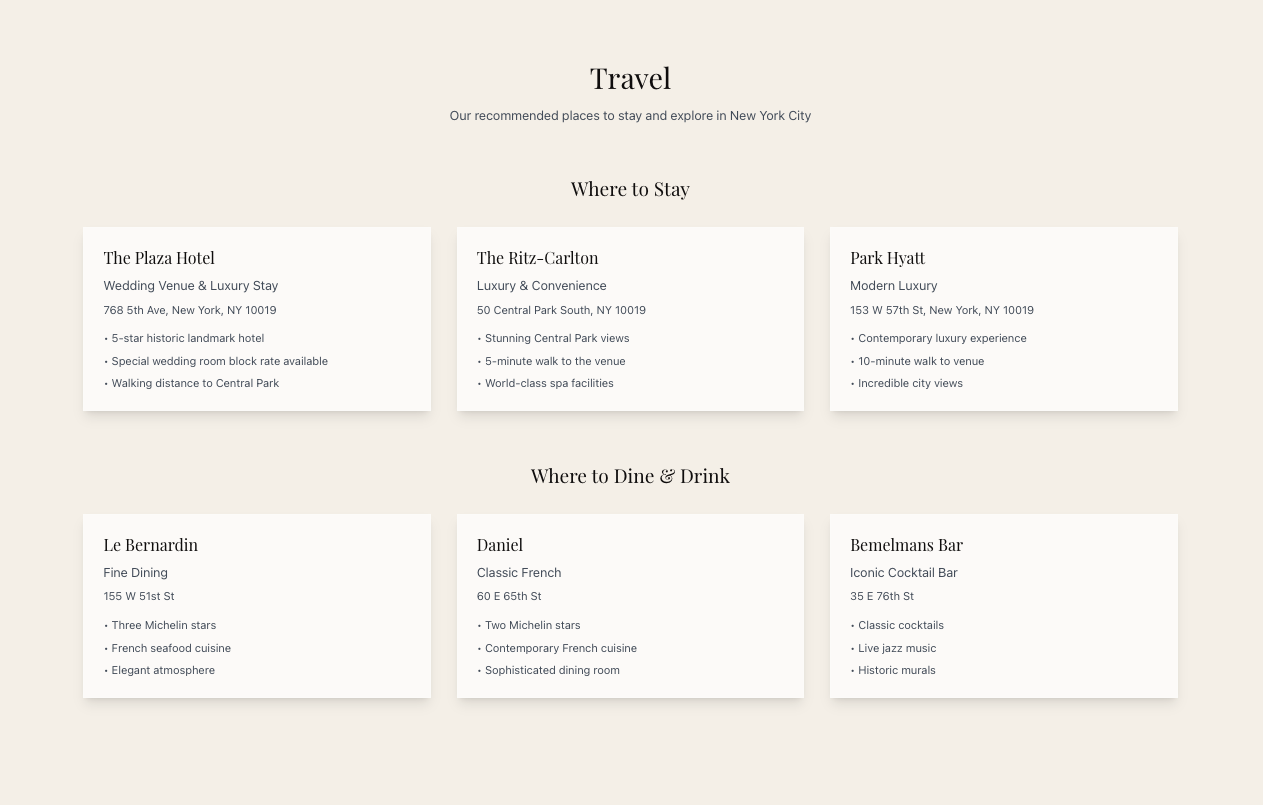
- Best airports to fly into
- Recommended transportation (taxis, shuttles, rental cars)
- Hotel block options & nearby lodging recommendations for various budgets
3. Gift Registry
Make gifting easy with direct links to:
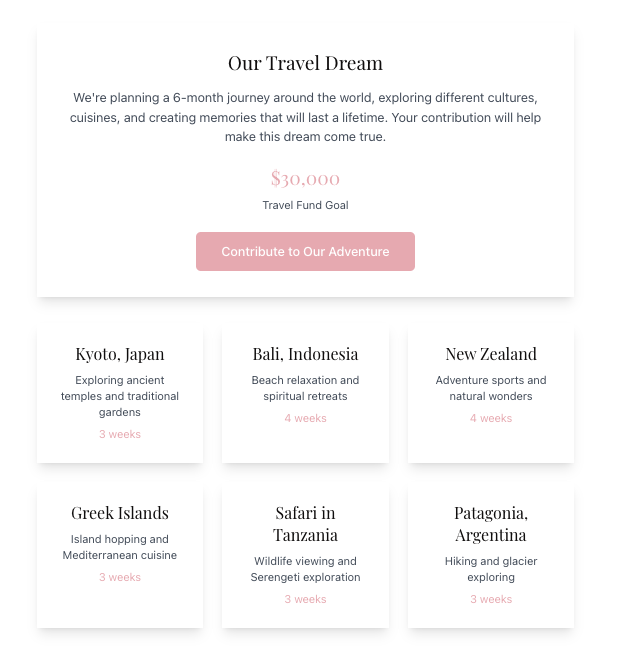
- A traditional gift registry
- A honeymoon fund for monetary contributions
4. RSVP & Guest List Management
Track attendance with an online RSVP system that collects:
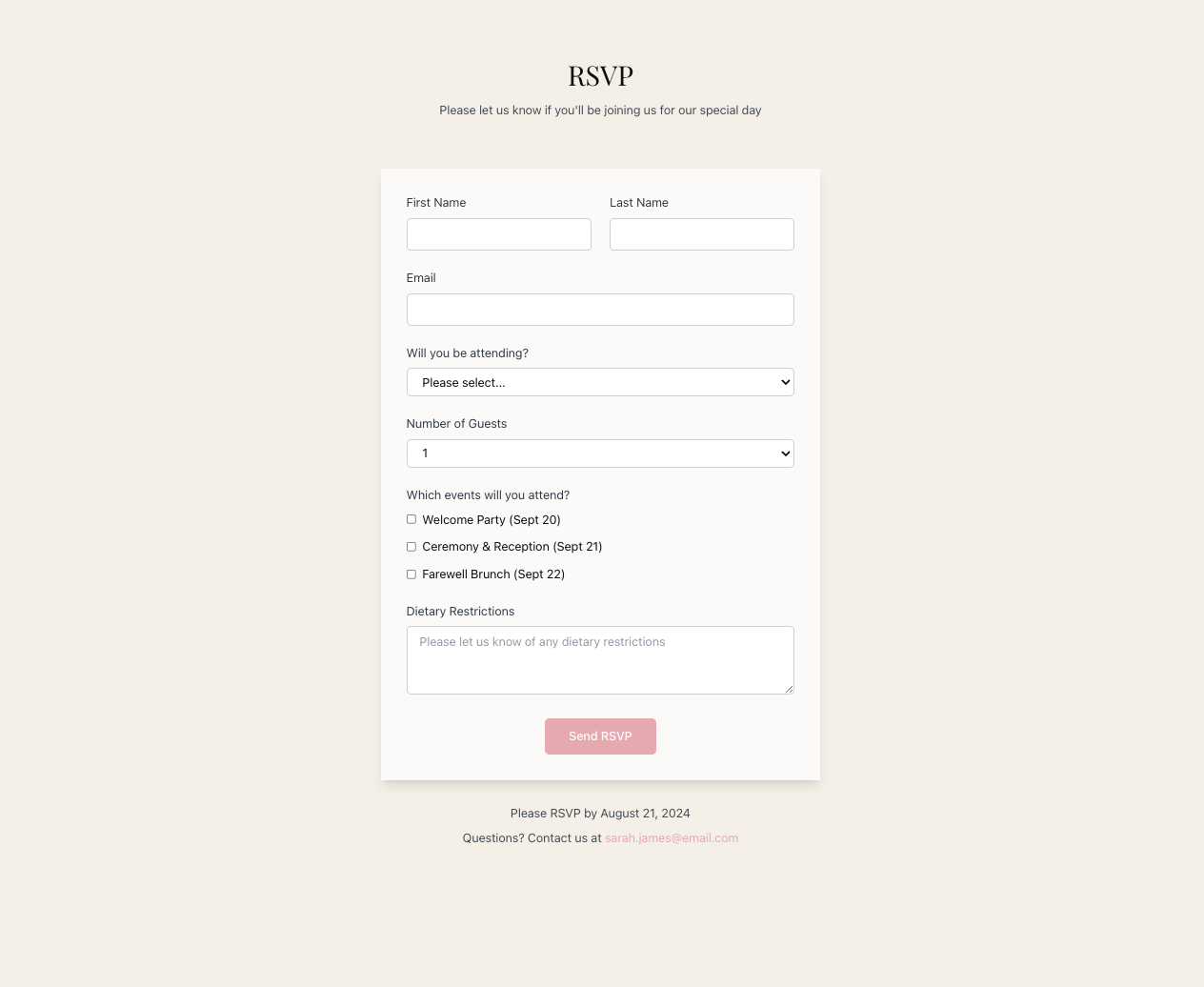
- Guest names
- Number of attendees
- Meal preferences
- Special requests
Bonus: Enable email notifications so guests receive last-minute updates instantly.
5. Dress Code & Weather Information
Include attire suggestions for different events (welcome dinner, ceremony, brunch) and any notes on expected weather conditions.
6. Your Love Story
Make it personal by sharing:
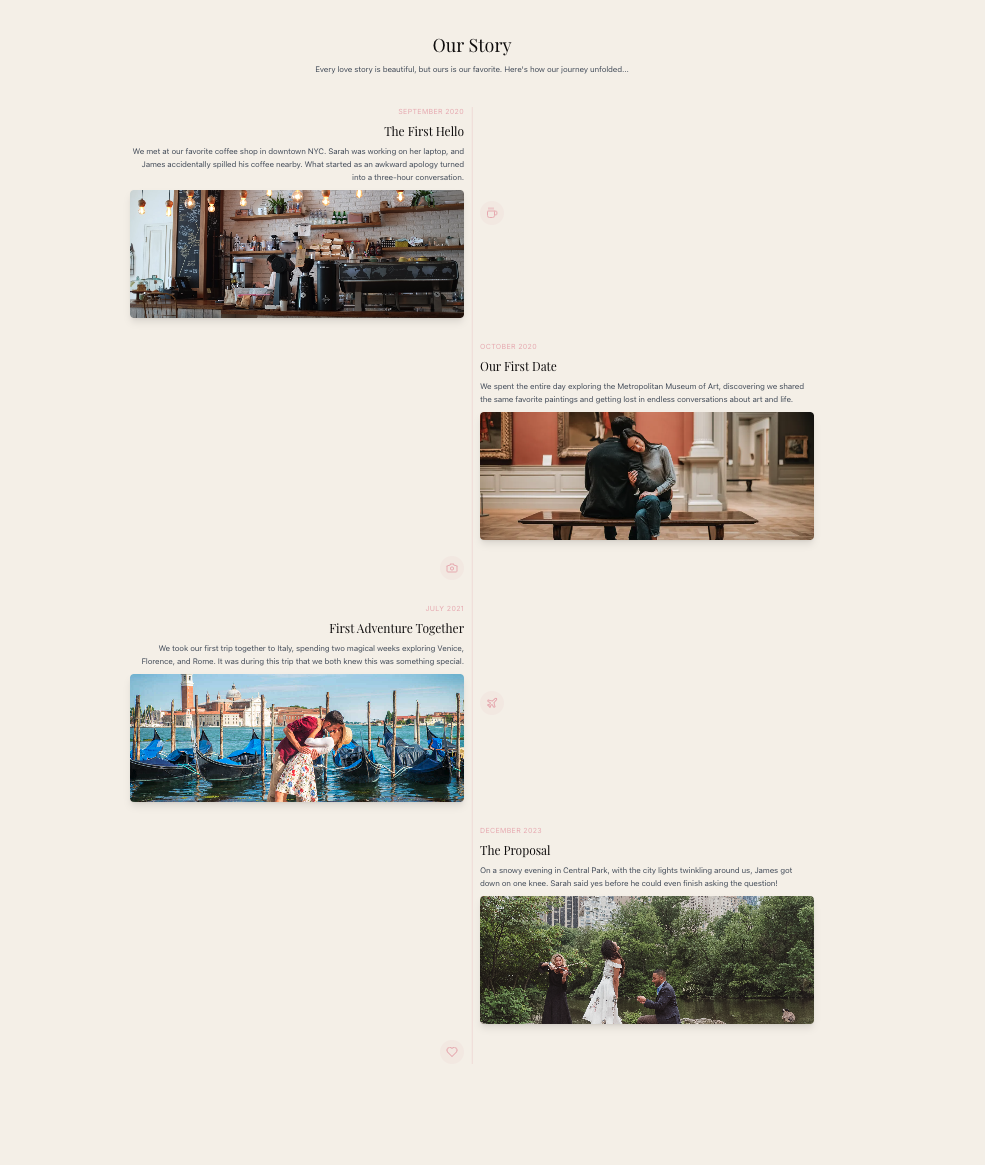
- How you met
- Memorable moments in your relationship
- The proposal story
7. Contact Information
For last-minute questions, include:
- An email address
- A phone number (if you’re comfortable sharing)
How to Make a Wedding Website
1. Choose a Platform
Opt for a user-friendly builder like Lovable to easily create a professional-looking wedding website.
While there is no one-size-fits-all tool, a well-structured wedding website keeps everything organized and easily accessible, significantly reducing guest inquiries and simplifying the planning process.
2. Pick a Theme & Customize the Design
Start a wedding website that aligns with your wedding vibe, adjusting colors, fonts, and layout to match.
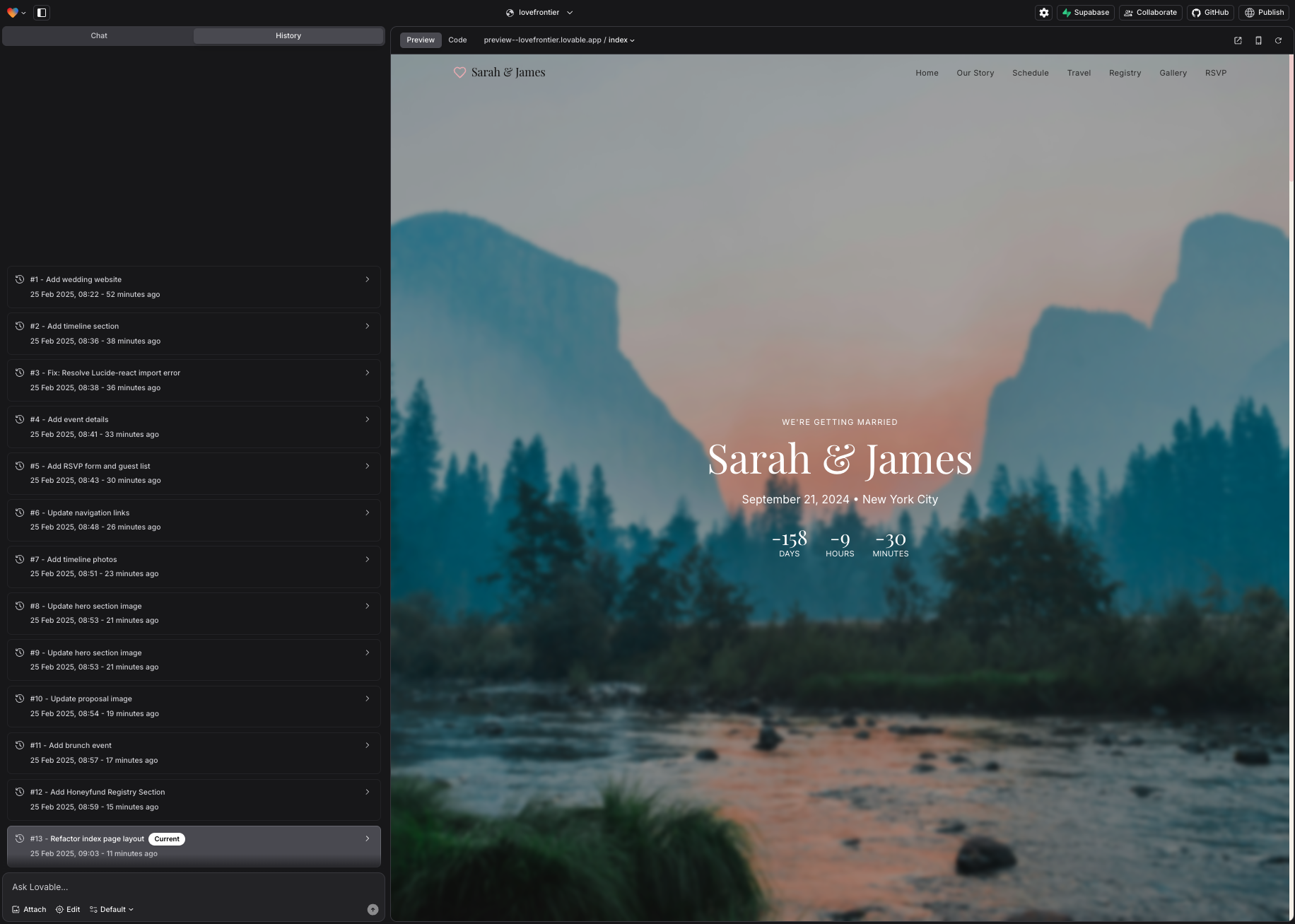
3. Add Essential Pages
Structure your site with key sections:
- Home – Welcome message & featured photos
- Our Story – How you met & your journey together
- Schedule – Event timelines & locations
- Travel & Accommodations – Helpful info for out-of-town guests
- Registry – Gift or honeymoon fund links
- RSVP – Online response form for guest tracking
4. Upload Photos & Personalize Content
Include engagement photos, venue sneak peeks, and any meaningful imagery.
5. Integrate Supabase for RSVP Management
Connect your website with Supabase to store and manage all guest RSVPs efficiently. This will allow you to:
- Collect and organize guest responses in real time.
- Automatically update attendee lists without manual tracking.
- Ensure all RSVP data is securely stored and easily accessible.
6. Set Up Resend for Guest Email Communication
Use Resend for email automation to keep guests updated with:
- RSVP confirmations and reminders.
- Venue or schedule changes.
- Post-wedding thank-you messages.
7. Test Everything
Before going live, double-check:
- Every link is working
- RSVP form functions correctly
- The site looks good on both desktop & mobile
8. Publish & Share
Click Deploy! Send out the link via email or include a QR code on your invitations.
Pro Tips for a Standout Wedding Website
- Start Early: Begin at least 6-12 months before the wedding to allow ample time for design, updates, and confirmations.
- Use a Custom URL: A memorable, short domain makes it easy for guests to access and fits better on paper or digital invites.
- Icebreaker Information: Help guests feel more connected by sharing how you met, key milestones, and moments leading up to the wedding.
- Keep It Simple: Avoid overwhelming guests with too much information—break details into clear, easily digestible sections.
- Explain Unique Traditions: If your wedding includes cultural or religious customs, provide context and participation instructions for guests.
- Optimize for Mobile: Ensure guests can access all details seamlessly on their phones or tablets.
- Enable Guest Notifications: Keep attendees updated on last-minute changes, like time shifts or location adjustments.
- Use Design Suites: Maintain visual consistency from save-the-dates to invitations and the wedding website for a cohesive experience.
- Follow Up with Photos: After the wedding, share an album or private gallery so guests can relive the memories without worrying about public exposure.
Final Thoughts
A wedding website is a modern-day essential for a stress-free, organized celebration. With Lovable, Supabase, and Resend, you can create a personalized wedding website for your guests.
Ready to build your perfect wedding website? I've done mine in 13 prompts with Lovable!



